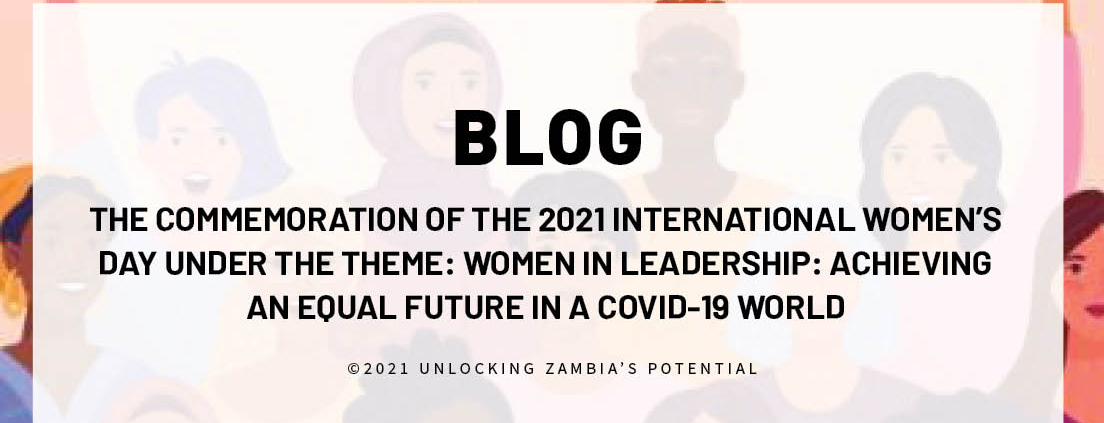The 2021 commemorations of International Women’s Day are like no other. As Zambia makes its way through a devastating pandemic that has shown no discrimination in its effects, there is a chance to reactivate the issue of exclusion and marginalization of women and girls. COVID-19 has delivered home some hard truths: in the social space, women and girls have been more adversely affected by the pandemic. Accounts of increased cases of Gender-Based Violence (GBV) in which some result in death; teenage pregnancies; are just some of the social ills that have dominated the news in the recent past.
In the economic space, women are still striving to put food on the table despite the uncertainties brought about by job losses and reduced business opportunities due to the pandemic. This pandemic is, therefore, a clarion call to action. Women must have the opportunity to play a full role in shaping the pivotal decisions being made as Zambia responds to and recovers from the COVID-19 pandemic.
To do this, we must break down the deep-seated historic, cultural, and socio-economic barriers that prevent women from taking their seats at the decision-making table to ensure that resources and power are more equitably distributed. Much of the intolerance and tokenism of days gone by cannot be allowed in shaping the agenda for
women’s participation in the response to the COVID 19 pandemic. Tokenism cannot be allowed in the new normal. A shift in the way we do things and view ourselves can enable women to contribute to the post-COVID socio- economic recovery of the country. Thus it is necessary for women to engage more deeply in the decisions that could change their future and that of their families.
Across the world, women remain concentrated in the lowest paid jobs with many in extremely vulnerable forms of employment. Women have been nearly twice as likely as men to lose their jobs during the COVID-19 crisis. Indeed, the pandemic has dramatically increased the poverty rate for women and widened the gap between men and women who live in poverty. As women take on greater care demands at home, their jobs are disproportionately affected by cuts and lay-offs. Such impacts risk rolling back the already fragile gains made in female labor force participation, limiting women’s ability to support themselves and their families, especially for female-headed households. In many countries, including Zambia, the first round of layoffs has been particularly acute in the services sector, including retail, hospitality, and tourism, where women are most represented. Perhaps this should make the case for the discussion of job creation outside of the formal sector into non-traditional areas such as agriculture, small-scale manufacturing, and mining. We believe that Government, through the 2021-2023 Economic Recovery Plan recognizes this and stands ready to support women. The onus is also on women to familiarize themselves with these important documents and claim this support immediately.
Despite the barriers, women have continued to be at the forefront of the response to COVID-19, be it in health facilities, the service industry, markets, in their families and communities. It is important to note that more inclusive leadership and representation leads to stronger democracies, better governance and better implementation of policies. We therefore, seek to amplify women’s voices and promote their participation and leadership in public institutions, parliament and generally in the development space. With support from Government, electoral quotas to gender-smart business policies, we believe women can help identify and address gaps in response to the pandemic; from ways to address gender-based violence and redistribute economic resources.
Therefore, to build a better way forward from the COVID-19 crisis, and to get Zambia firmly back on track, we cannot simply return to the world we knew before. We must do things differently as required by the new normal. That means shattering the barriers that have previously held women back. This year’s International Women’s Day is a rallying cry for Generation Equality. It is time to finally fully harness the power of women’s leadership to realize a more equal, more inclusive, and more sustainable future.
As women, we ought to ride on the shoulders of those who have led the way: through following their optimism, purpose and courage; believing in our limitless potential to add value to achieve growth and impact. Her Honor the Vice President Inonge Wina at the helm of the Disaster Management and Mitigation Unit (DMMU) at such time as this has shown that everyone has the potential and opportunity to be an impactful leader. Leadership, like love, success or beauty is a word with as many definitions as there are people. And like many of these other words and concepts, leadership has some fundamental truths. One of these fundamental truths is service. The pandemic calls for each one of us to serve. Leadership is consciously seeking, recognizing and acting on opportunities to make things better for oneself and for others. The COVID-19 Pandemic represents such an opportunity and women are reminded to take up their positions to serve in whatever capacities they find themselves in; at home, at work, the community, and at national level. Therefore, as we commemorate International Women’s Day under the theme “ Women in Leadership: Achieving an Equal Future In a COVID 19 World“ we recognize the tremendous efforts so far made by women and girls around the world but more so by our own Zambian shereos in shaping a more equal future and recovery from COVID-19.
It is against this background that PMRC, calls for women to be Ambassadors for the post-COVID-19 response agenda as the country implements the Economic Recovery Program 2021-2023.




